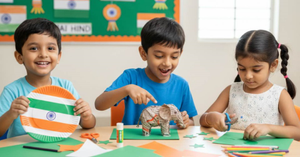Let’s be real: Summer vacation is supposed to be about fun, family, and making memories, not endless nagging about unfinished holiday homework. If you’re a parent, you probably know the struggle. You want your kids to enjoy their break, but you also don’t want that last-minute panic when school is about to reopen. The good news? With a few smart, modern strategies, you can help your kids finish their summer homework early and still have plenty of time for all the things that make summer special.
Why Do Kids (and Parents) Struggle With Holiday Homework?
Before diving into solutions, let’s talk about the real challenges parents face:
- Kids get distracted easily thanks to screens, friends, and the lure of doing nothing.
- Parents are busy, too, juggling work and home, and don’t want to spend the whole summer nagging.
- Sometimes, the homework feels overwhelming or just plain boring.
- Kids may not see the point of doing the work early if their friends aren’t doing it.
- Finding the balance between enjoyment and responsibility can feel impossible.
Sound familiar? You’re not alone. But there are ways to make things easier and even enjoyable.
Hack #1: Co-Create a Fun Homework Plan
Forget those old-school timetables that no one follows past day two. Instead, sit down with your child and create a simple, colorful plan together. Use a digital calendar or a whiteboard, something you both can see and update. Let your child pick which subjects to tackle on which days, and mix things up to keep it interesting.
Tip: Add stickers, emojis, or even short rewards after each session. The more involved your child feels, the more likely they are to stick to the plan.
Hack #2: Use Technology to Your Advantage
Kids love gadgets, so why not use them for homework? There are tons of free apps that can help break big assignments into smaller tasks, set reminders, or even make learning fun. Try tools like Google Keep for to-do lists, or use Pomodoro timer apps to break study time into short, focused bursts with breaks in between.
Bonus: If your child has to research or create presentations, let them use tools like Canva or PowerPoint. It feels less like homework and more like a creative project.
Hack #3: Make It Social (But Safe)
If your child’s friends are also working on holiday homework, set up virtual or in-person “study hangouts.” Kids can work together, quiz each other, or just keep each other company while they finish assignments. This makes the process less lonely and more motivating.
Safety Note: For younger kids, keep group sessions short and supervised. For older kids, check in from time to time to make sure they’re staying on track.
Hack #4: Mix Work With Play
Don’t make homework the villain of summer. Pair study sessions with something fun—a favorite snack, a short walk, or a quick game. For every 30 minutes of homework, promise 15 minutes of something your child enjoys. This helps kids see that work and play can go hand in hand.
Hack #5: Tackle the Tough Stuff First
Most kids (and adults) tend to put off the hardest tasks. Flip the script: encourage your child to start with the subject or project they find most difficult. Once it’s out of the way, everything else feels easier. Celebrate the win together, even if it’s just with a high-five or a special treat.
Hack #6: Keep Communication Open
Instead of asking, “Did you finish your work?” try, “How can I help you with your homework today?” Sometimes, kids just need a little support, whether it’s brainstorming ideas, reading instructions together, or just sitting nearby while they work. Be their cheerleader, not their supervisor.
Common Challenges (and How to Beat Them)
- Procrastination: Break tasks into tiny steps. Celebrate each small win.
- Lack of Motivation: Tie homework to real-life rewards like a family outing once a big project is done.
- Distractions: Create a “homework zone” free from devices (unless needed for work). Use noise-cancelling headphones or calming music if your home is noisy.
- Overwhelm: Remind your child they don’t have to do it all at once. A little bit each day goes a long way.
- Comparisons with Friends: Remind your child that finishing early means more time for fun and maybe even helping friends later.
Conclusion
At the end of the day, summer is about making memories. Getting homework done early means less stress and more time for what really matters—family, friends, and fun. With a little planning, some tech-savvy tools, and lots of encouragement, you can help your child breeze through their holiday homework and still have the best summer ever.








Be the first one to comment on this story.